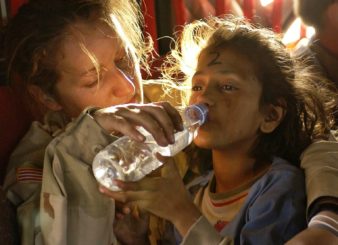
When the laws of the state and of God do not align, American Christians have a choice to make.
Sarah Quezadastop. She discovered two brothers who were worried about their sister. The trio was hungry and thirsty. The young woman, Esmeralda, was dehydrated and had untreated wounds that appeared infected and made it difficult for her to walk. Teresa encouraged the siblings to get out of the cold and sit in her car while she made a few calls to try to find some help for them. Within minutes, a local sheriff pulled up with his lights flashing, and by the end of the evening, Teresa was in a holding cell.
The siblings Teresa stopped to help were three undocumented immigrants from El Salvador who had crossed the border and gotten lost when the rest of their group pushed ahead faster than Esmeralda could travel in her state. Teresa was told she might be found guilty of “transporting illegal aliens” for her decision to help. After being detained for three hours that same evening, Teresa was released. However, a few days later, a federal agent showed up at her office with a search warrant for her phone. According to a spokesperson for Border Patrol, Teresa’s case is still considered “active.”
As a child raised deep in the heart of 1980’s evangelicalism, two stories stand out when I think about what I learned regarding breaking the law. The first drama unfolded on the flannelgraph board as Daniel was made a leader in the kingdom. His growing authority angered his enemies and they said to themselves, “We will never find any basis for charges against this man Daniel unless it has something to do with the law of his God” (Daniel 6:5). So they convinced the king to issue an edict making it illegal to pray to anyone except the king. Daniel’s immediate response was to go to his upstairs room, get down on his knees, and pray. He was promptly arrested and thrown into the lion’s den. Then, a flannelgraph angel floated down to rescue him.
My second encounter with Christians breaking the law came through a comic book called God’s Smuggler. The story of Brother Andrew, a missionary who smuggled Bibles across borders into countries that were hostile to Christianity, thrilled me. I imagined taking such risks in the name of Jesus. I read with awe and intrigue as comic Brother Andrew approached border checkpoints praying for God to close the eyes of inspectors as they opened his trunk, filled with the contraband Scriptures. I wanted to have the faith of Daniel and Brother Andrew. I wanted to care so deeply about my commitment to God that I would be willing to risk something to follow Jesus.
I wanted to have the faith of Daniel and Brother Andrew. I wanted to care so deeply about my commitment to God that I would be willing to risk something to follow Jesus.
Teresa walked in the footsteps of the Good Samaritan story in Luke 10, literally stopping by the side of the road to help someone who had been injured. Still, many Christians wrestle with these actions. Should she have helped someone who entered the country illegally? Does Esmeralda deserve assistance, or are the challenges she faces a direct result of the choices she made? Doesn’t the government have the right to punish those who break the law, regardless of their reasoning?
Governments can make any laws they want, and the edicts they issue do not have to adhere to God’s laws. Current efforts to curb immigration have included increased prosecution of “Good Samaritans” like Teresa who offer assistance to undocumented immigrants. Recently, volunteers with No More Deaths were convicted for leaving water and canned food for migrants in the desert. Many of these laws gained attention in 2011 when Alabama’s then-Senator Jeff Sessions passed HB 56, which included some of the country’s harshest immigration laws, criminalizing transporting, harboring, or concealing undocumented immigrants. Immigration advocates raised concern that these laws could be used to criminalize behavior such as giving immigrants rides to church, having people in your home for dinner, or allowing someone to stay the night. But supporters of the law insisted the intention was only to prevent human trafficking. Much of HB 56 was stopped by the courts, but the Trump administration breathed new life into these efforts when Jeff Sessions was tapped to become attorney general in 2017. NPR reports that, since 2015, there’s been a 30% increase in people being federally charged for “bringing in and harboring migrants.”
For many Christians in the current climate, it may feel easier to simply opt out. After all, what are the odds a trio of Salvadoran siblings will flag most of us down on the side of the road? And some may feel that giving water to an immigrant who has entered the country illegally is different than praying. But I believe this distinction separates the spiritual from the physical in ways that deny Jesus’ embodiment of the full Gospel, which was good news to all people. Jesus prayed. Jesus healed. Jesus preached. Jesus fed the hungry. Scripture constantly reminds us to be kind to foreigners, to welcome the stranger, to serve the hurting. When these actions are criminalized by the state, we must recognize that choosing to obey the state means choosing to disobey God.
…some may feel that giving water to an immigrant who has entered the country illegally is different than praying. But I believe this distinction separates the spiritual from the physical in ways that deny Jesus’ embodiment of the full Gospel, which was good news to all people.
The reality that Christlike behavior is being criminalized should be troubling for us all. What will we do when we are faced with those moments when God’s law and the laws of the state do not align? In his book Break Open the Sky, former World Relief president Stephan Bauman writes, “When we are afraid, we are more likely to compromise what’s most important to us—our convictions about faith, character, or even the nature of truth. We are especially susceptible when are offered some form of real or perceived security in exchange for compromising our faith.” We may find that protecting ourselves from the consequences of man’s law exposes the vulnerable parts of our faith that cannot stand against even the smallest challenge or persecution. We may be disappointed to discover our commitment to Christ was contingent on its convenience and ease.
I am reminded of another Bible story. Queen Esther also violated the edict of the king, and she did so in order to protect the lives of the vulnerable. One of her reasons was that she was also a Jew. She knew she could not opt out of the laws that put her people in extreme danger. Many of us wrestle with the tension of valuing solidarity and wanting to stand with immigrants, and fearing that we may lose something in the process: our reputation, our freedom, our security, our comfort. We may want to engage, but if we’re honest, we may also be holding on to the desire to retreat to safety when the flames get too hot.
When the laws of the state and of God do not align, American Christians have a choice to make. Who will we follow? Who will we be as people of God? Will we follow God’s law even when it is illegal according to the laws of the state? Many in the global church—including many immigrant Christians in the U.S.—have grappled with these questions for much longer and with much higher risk than many of us have ever experienced. They are modern-day examples walking in the footsteps of Daniel, Brother Andrew, and Esther, whom we can learn from and follow.
 Sarah Quezada is a writer living in Atlanta, Georgia. She has a master’s in sociology and more than a decade of experience working across cultures and leading conversations about justice, faith, and serving among the poor. Her writing has been published in Christianity Today, Relevant, Sojourners, and InTouch Ministries, among others. She and her husband, Billy, who emigrated from Guatemala City, are raising two bicultural and trilingual-ish kids. When they first married, the couple walked together through the immigration system. This experience inspired her first book, Love Undocumented: Risking Trust in a Fearful World. Together, they founded Bridge, a social impact start-up in Guatemala City.
Sarah Quezada is a writer living in Atlanta, Georgia. She has a master’s in sociology and more than a decade of experience working across cultures and leading conversations about justice, faith, and serving among the poor. Her writing has been published in Christianity Today, Relevant, Sojourners, and InTouch Ministries, among others. She and her husband, Billy, who emigrated from Guatemala City, are raising two bicultural and trilingual-ish kids. When they first married, the couple walked together through the immigration system. This experience inspired her first book, Love Undocumented: Risking Trust in a Fearful World. Together, they founded Bridge, a social impact start-up in Guatemala City.


